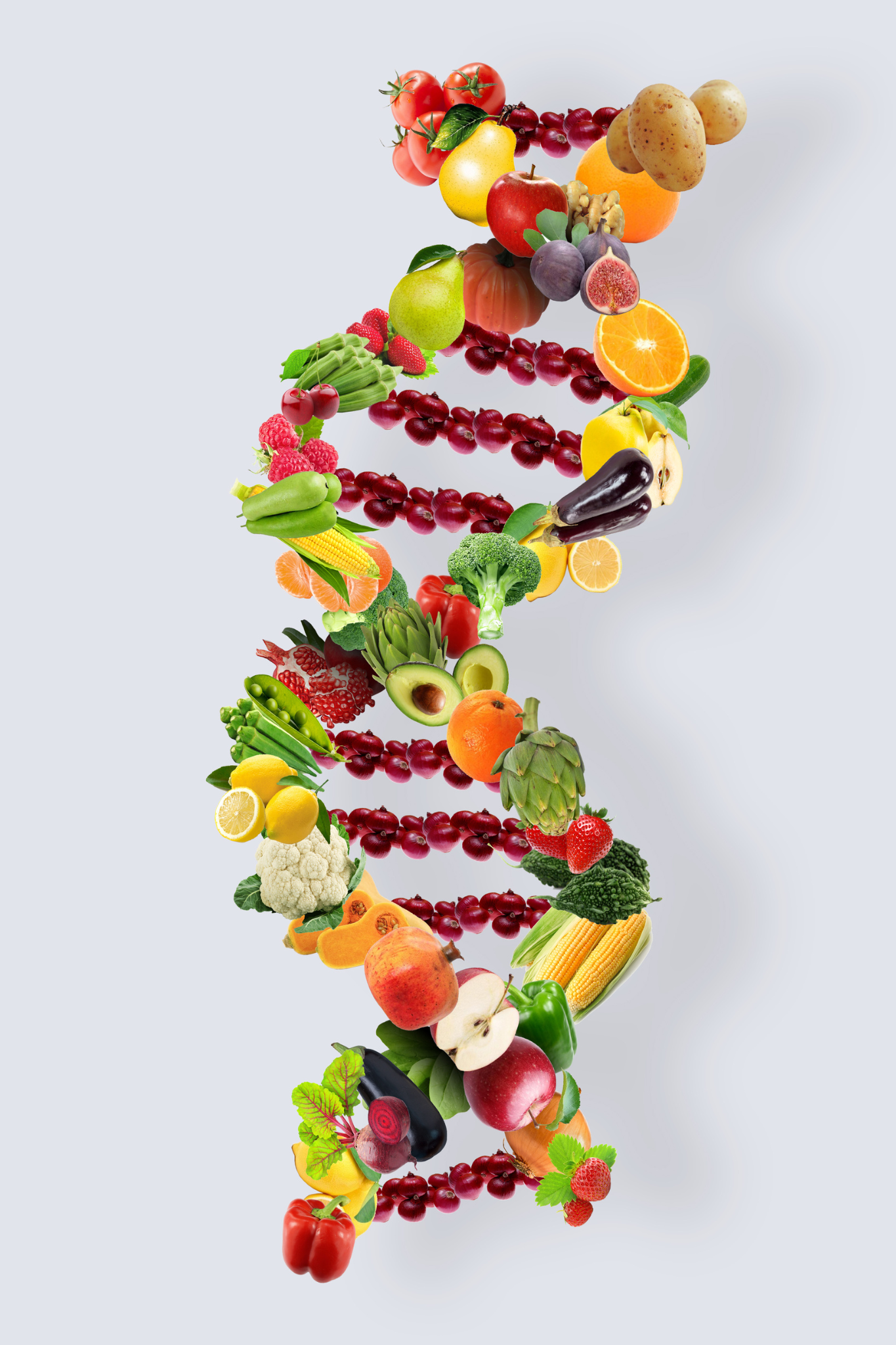DNA genomic testing – nutrigenomics and pharmacogenomics
The aim of both disciplines is to individualize and personalize nutrition and medicine, and ultimately the individual’s health, by tailoring the food and medication to the individual genetic constitution (genotype). Each human is genetically unique.
Nutrigenomics and Pharmacogenomics offer the promise of personalizing the nutrition and the medication to the genotype of the consumer, based on the knowledge of the individual genes variations, and their interaction with the nutrients and medication.
This individualized approach to healthcare will allow for more precise, predictable and preventive health care customized for the individual patient.
Nutrigenomics testing - DNA based, individualized nutrition.
Nutrigenomics is a science studying the relationship between human genome, nutrition and health. It uses a range of DNA tests to gain a greater understanding of what individuals need for optimal health and nutrition. Nutrigenomics tests cover a large spectrum of genetic qualities, including weight management, chronic disease risk management, athletic performance, high-intensity exercise recovery, well-being and more.
Here are the areas of our Nutrigenomic Testing:

01.
DNA Sport: Physical training raised to the level of science
The effectiveness of training and sporting performance is affected by key biological areas, and with DNA Sport, we can help personalize a training strategy that optimizes your genetic potential, and identify the right lifestyle, nutrition and environmental interactions to optimally express your genetic potential. From exploiting potential advantages and identifying weaknesses, the DNA Sport test can distinguish every aspect of a person’s sporting potential. These insights can then be used to personalize a training program and identify appropriate training and nutrition choices.
DNA Sport reports on the following areas:
- structural integrity of soft tissues
- inflammation & oxidative stress
- blood flow & respiration
- energy during exercise
- fuel during exercise
- caffeine metabolism
- muscle and bone composition
- aerobic capacity and power/strength potential
02.
DNA Estrogen: Take control of your life.
A majority of breast cancer occurs in women with no family history of it, but estrogen gene testing can assist in identifying at-risk individuals and thereby lessen the risk of undetected cancers. DNA Estrogen tests for gene variants has shown to have an impact on how estrogen is processed in the body and if the processing of estrogen and related compounds is efficient and healthy.
The DNA Estrogen test guides the personalization of diet, hormone and nutritional supplement recommendations to improve estrogen metabolism.
Not only does DNA Estrogen benefit men and women who suffer from numerous estrogen-dominant conditions, but also the test is particularly important for women considering:
- oral contraceptives
- hormone replacement therapy
- bio-identical supplementation
- in-vitro fertilization, or who have been diagnosed with estrogen receptor-positive breast cancer
- DNA Estrogen reports on the following areas:
- variations in key genes involved in metabolizing estrogen and related compounds
- intervention strategies for carriers of high-risk genetic variations
- personal risk factors associated with HRT, Oral contraceptives, bio-identical supplementation and in vitro fertilization
- practitioners use DNA Estrogen test results to prescribe individualized nutritional and lifestyle interventions to mitigate breast cancer risk in women with high-risk genetic profiles


03.
DNA Health: Start living your healthiest life today.
DNA Health is designed to identify any potential lifestyle diseases and to optimize a patient’s well-being and health by personalizing their lifestyle and diet choices. The DNA Health approach assists the healthcare practitioner in establishing the optimal nutrition necessary for good health, longevity and disease risk mitigation.
DNA Health tests for 36 gene variants involved in the following biological processes that were linked to risk for diseases of lifestyle:
- cholesterol metabolism
- bone Health & risk for osteoporosis
- methylation and risk for cancer
- inflammation, Oxidative Stress and Detoxification
- insulin Sensitivity and risk for diabetes
- food Responsiveness, including Lactose intolerance, Caffeine processing, Salt sensitivity and blood pressure & Iron overload disorder
04.
DNA Diet: Your DNA is unique to you; we believe your diet should be too.
As part of this world-leading product offering, DNA Diet also provides additional insight into how each individual patient reacts to: carbohydrates, saturated fats, and exercise. This allows a dietician to personalize an optimized eating plan that is scientifically driven to work. Weight management and healthy eating are integral to long-term health and can prevent poor health and various chronic diseases. There is no one diet or way of eating that is correct for everyone, but DNA Diet will identify the best way for you.
DNA Diet tests several gene variations that affect metabolism, absorption and storage of fats and carbohydrates, as well as eating behavior to understand how an individual’s genetic profile will affect their response our most effective healthy eating plans:
- low fat
- mediterranean
- low Carbohydrate
- It is important to note that DNA Diet is not a diet plan and simply having the test done in no way contributes to weight loss.


05.
DNA SKIN: Look younger for longer with a healthier skin.
Your genetics determines everything about you, including how your DNA handles the potentially destructive exposure to UV rays. Based on the results from the DNA Skin test, recommendations are given to improve skin care and decrease the visible signs of aging.
DNA Skin tests for 19 gene variations involved in the following areas:
- firmness and elasticity
- sun sensitivity & pigmentation
- sun damage, protection & repair
- antioxidant status and Inflammation
06.
DNA Mind: A sound mind in a sound body.
According to research, neuropsychiatric disorders account for up to 25% of all disability-adjusted life years. While the heritability of these mental disorders is significant, environmental factors also factor into their development. Genetic variations involved in key biological processes that contribute toward the risk of development of mental health disorders may give insights to the prevention, diagnosis and treatment of the disease.
The DNA Mind Report Provides:
- identification of the level of impact of any genetic variants
- an explanation of their impact on the specific biochemical area
- an explanation of each area’s impact on mental health
- Taking the test may help you understand ways that may avoid the onset of a range of neurological disorders. The DNA Mind test analyses 30 genes, which have been shown to have significant associations with key mental health disorders, and reports on the following areas:
- neurodegenerative disorders: Alzheimer’s disease, dementia, cognitive decline
- addictive behavior: A risk for alcohol, nicotine, cannabis & opioid dependence
- psychosis response from cannabis use; eating disorders (binge eating)
- adrenaline-seeking: Risk-taking behavior
- mood disorders: Depression, bipolar, anxiety and post-traumatic stress

Pharmacogenomics Tests: DNA based, individualized response to medications
(A 90 minutes initial comprehensive evaluation has to be completed before the test below to be ordered)
Pharmacogenomics is the study of how genes affect a person’s response to medications. There is a well-known individual variation in response to medication among individuals and this poses a serious problem in medicine. There are no biomarkers at present that can predict which group of individuals will or will not respond positively and which will experience adverse reactions for the same medication and dose. Physicians have to optimize a dosage regimen for an individual patient by a trial-and-error method. This kind of approach may cause adverse drug reactions in some individuals. In more than two million cases annually in the US, adverse reactions, including 100 000 deaths have been reported to occur. Pharmacogenomics empowers the doctor to provide specific medical interventions, based on the patient’s genetic profile and replaces the current trial and error approach to drug therapy.
Individuals most likely to benefit from pharmacogenomics testing include those:
-Experiencing side effects of specific medications
-Not responding to specific medications
-Requiring doses outside the recommended range
Get started
Join us and let us help you improve your health.
Get started
Join us and let us help you improve your health.
Select the program that works the best for you.
